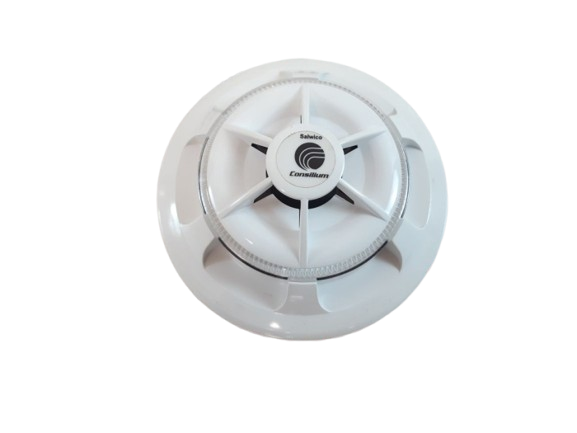Marine automation has changed the way ships and offshore platforms work in terms of efficiency and safety. Probably one of the most important factors in marine safety is an advanced heat detector. Devices like these are essential in fire detection and prevention, hence protecting assets and life in the harsh marine environment. In this blog, we will explain why advanced heat detectors are essential; their features and benefits, applications, and how important they are to the marine automation.
Heat Detectors in Marine Automation

Heat detectors are special temperature-sensing devices. In marine automation, they are used to detect early signs of fire so that appropriate action can be taken to prevent potential disasters. Unlike smoke detectors, which can easily be affected by moisture and salt in the marine environment, heat detectors provide reliable performance because they are focused only on temperature changes.
Types of Heat Detectors for Marine Automation
Advanced heat detectors for marine automation come in various types, each suited for specific needs and environments:
1. Fixed-Temperature Heat Detectors
- Trigger an alarm when the surrounding temperature exceeds a pre-set threshold.
- Ideal for areas with stable temperature ranges.
2. Rate-of-Rise Heat Detectors
- Detect rapid increases in temperature over a short period, regardless of the absolute temperature.
- Suitable for engine rooms and machinery spaces where sudden temperature changes indicate potential fire hazards.
3. Combination Heat Detectors
- Increase accuracy using a combination of fixed-temperature and rate-of-rise technologies.
- Use it in flexible marine applications.
4. Linear Heat Detectors
- Detect heat over a continuous line by using cables or sensors.
- Excellent for large areas such as cargo holds and storage rooms.
Advanced Features of Advanced Heat Detectors
The features of advanced heat detectors are what make them best suited for marine applications:
- Resistance to corrosion: It shall be resistant to saltwater, moisture, and other harsh marine environments.
- Durability: It shall withstand the common vibrations of a typical marine application, temperature changes, and long hours of operation.
- High Sensitivity: It should quickly detect temperature changes at the same time as minimizing false alarms.
- High Integration capabilities: It can easily be fitted into marine automation systems to have online monitoring and alerting.
- Compliance with Standards: It meets the international safety standards of the maritime type, including SOLAS and IEC 60092.
Advantages of Heat Detectors in Marine Automation
The following are some of the advantages associated with the investment of high-performance heat detectors for marine automation:

- Early Fire Detection: The early detection of fire risks ensures immediate action that prevents the escalation of damage and possibly loss of lives.
- Less False Alarms: With the latest technology and calibration, only real threats will raise an alarm.
- Increased Security: It will safeguard the crew, passengers, and cargo with a reliable fire detection and alarm system.
- Cost-Effective Protection: The prevention of fires also minimizes repair, downtime, and potential fines for failing to meet safety standards.
- Smart Integration: Heat detectors from the latest technological equipment can be integrated into central marine automation systems to provide a coordinated response in safety.
Application of Heat Detectors in Marine Automation
Heat detectors find a range of applications in marine operations. Some of them are as follows:
- Engine Rooms: Overheating of machinery and engines are detected to prevent fires.
- Cargo Holds: Temperature fluctuations are monitored for the protection of valuable cargo against fire hazards.
- Accommodation Areas: Ensure the safety of crew and passengers by detecting potential fire risks in living quarters.
- Control Rooms: Protect critical electronic systems and automation equipment.
- Storage Areas: Storage of flammable materials safely and preventing outbreak of fire.
- Offshore Platforms: Effective fire detection in far-off and rugged locations.
How to Select the Most Appropriate Heat Detector for Marine Automation
This will be based on the following aspects:
- Application Needs: The exact requirements of the space that the detector is being installed in need to be decided.
- Environmental Factors: Temperature variation, moisture, and exposure to seawater.
- Sensitivity Level: Select the detector whose sensitivity is adequate so as to not produce false alarms.
- Integration Needs: Compatible with the current marine automation and alarm systems.
- Compliance Standards: Ensure that the detector meets international maritime safety standards.
Why Heat Detectors Are Important for Marine Safety?
Marine environments are even more prone to fire risks due to the readily available flammable material, confined spaces, and challenging conditions. Advanced heat detectors give a robust answer to mitigate these risks. Their ability to deliver reliable and accurate fire detection ensures that potential hazards are addressed before they escalate.
Future Trends in Heat Detection for Marine Automation
Marine automation is continuously evolving. New innovations of heat detection technology are as follows:
- Smart detectors: IoT-based systems for long-distance monitoring and more analytical performance.
- Wireless technology: Installation-friendly wireless heat detectors with high flexibility.
- AI-based detection: Artificial intelligence to track the data and take a predictive and preventive measure towards fire hazards.
- Eco-friendly: Developing energy-efficient and sustainable solutions for heat detection.
Advanced heat detectors are a fundamental part of marine automation. It ensures the protection of a ship, its platform at sea, and their people on board. Advanced heat detectors can also make marine safety better in areas of early fire detection, minimum false alarm, and even smoother interfacing with the automation systems. With modernization in technology, heat detection will only continue to get better as a highly reliable and efficient maritime product. Investing in Top-quality heat detectors is not only a question of compliance but also about safeguarding lives, assets, and the environment at sea.


Validate your login
Sign In
Create New Account